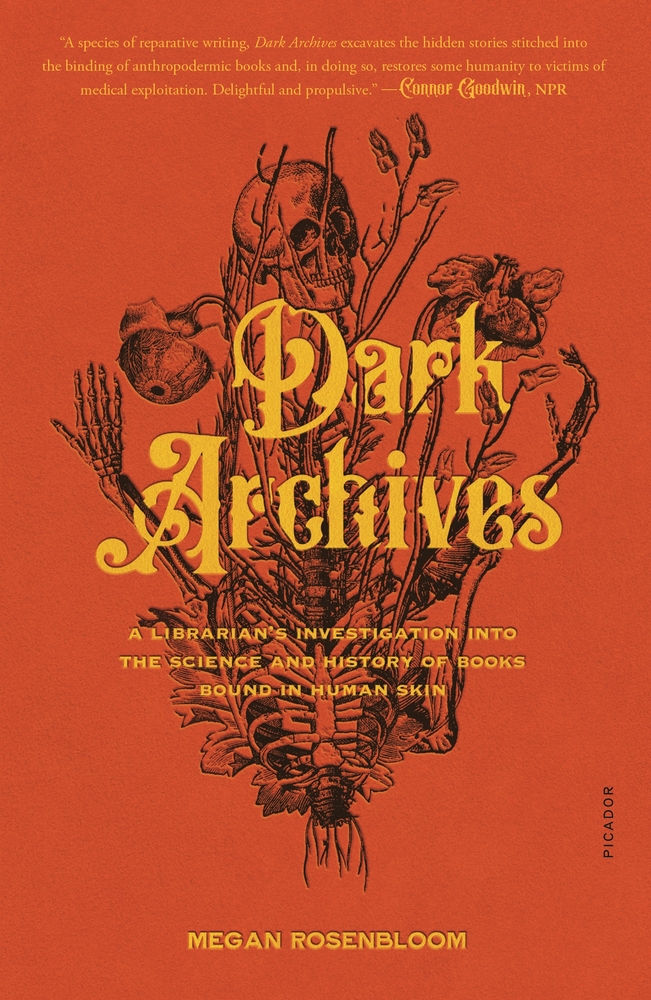book review: dark archives
- Shellie Taylor
- Nov 25, 2024
- 4 min read

I recently finished reading the book Dark Archives: A Librarian's Investigation into the Science and History of Books Bound in Human Skin by Megan Rosenbloom. Go ahead and read that subtitle again. You read it correctly. This is a book about other books bound in human flesh.
This book was recommended to me through the Morbidly Curious Book Club, a subscription service that offers discussion on unusual nonfiction titles while supporting small businesses and local bookstores. I have several books on their reading list that I've checked out from the library waiting to be read. This one in particular felt like it had a place on my website because of the content. Books bound in human skin. Books that are serving in a similar capacity to a cemetery. Books that hold a piece of a person's body.
Before I get carried away praising this book, I should clarify that this isn't some Hannibal Lecter horror story. Many of the books that have been bound in skin are medical texts. During an age when body experimentation was all the rage and doctors were desperate to learn how the human body worked, medical students and professionals were collecting textbooks. Those who could afford it would have their private collection, or a few favorites, bound in some type leather. The most typical was sheep or cow skin. But the few who were fascinated by their profession and could come into contact with a cadaver to dissect, made the choice to bind a book in the flesh of one their experimental subjects.
In a world where consent means everything, we wouldn't dream of donating someone's organs after death if they didn't have a red heart on their driver's license. Bodies are typically buried or cremated after death in accordance with the decedent's wishes. In the 19th century, consent was a foreign concept. Many people did not have a choice in what happened to their body following death. The chosen career of those known as the Resurrectionists made their living digging up fresh graves and robbing them of bodies in order to sell them to a local anatomist for upwards of $2,000 in today's money.
Rosenbloom discusses several men who were charged and convicted of murder. Their motive was to turn the dead bodies into cash by selling the cadavers to people in the medical field. Medical schools were in desperate need of subjects for the students to dissect and learn from. But being dissected at that time was not considered flattering or pleasant. Many people thought it was disrespectful to cut up a body postmortem. Convicted criminals who were hung on the gallows for their crime understood that part of their punishment was to have their body dissected publicly following their execution. Most people would not have volunteered this fate for their corpse.
Dark Archives talks about the moral implications of these medical experiments and the outcomes of them, many of which included cadaver skin being used for book binding. Rosenbloom is part of a group that travels around the world and performs tests on suspected anthropodermic books to determine if a book was actually bound in human skin or animal leather. More often than not, tests prove that the book is bound in sheep or cow skin, but the ones that are confirmed to be human skin undergo additional testing. DNA tests can be done to try and determine who the skin belonged to. Lots of research goes into trying to identify the skin. I'm telling you, it's an absolutely fascinating process.
The book also emphasizes the present-day need for body donations in the medical field. Modern day law makes it illegal to profit from the sale of body parts, so thankfully we don't have to worry about Resurrectionists anymore, but the need to learn about the human body still exists. My paternal grandmother died of diabetes and I have the paperwork from 1987 when she died from the medical facility thanking the family for her body donation. She wanted them to study her and possibly one day be able to cure the disease which took her life.
While you cannot be an organ donor and a body donor (most medical facilities need cadavers to be intact with all organs accounted for), there are still other options. I am an organ donor, but I plan on donating my body to Western North Carolina's Forensic Science program. WNC has a body farm where they study decomposition and students are able to learn about how to properly assess a crime scene for a future career in law enforcement. Essentially my body would become compost and my bones could be used for further education. The commentary of this book now makes my wishes not sound so macabre.
If you think the book sounds interesting so far, wait until you read the chapter that talks about preserving tattooed skin!
Highly recommend this book for all the people who are weird like me and enjoy an unusual subject every now and then. If you're interested in the Morbidly Curious Book Club or their reading list, visit the website.




Comments